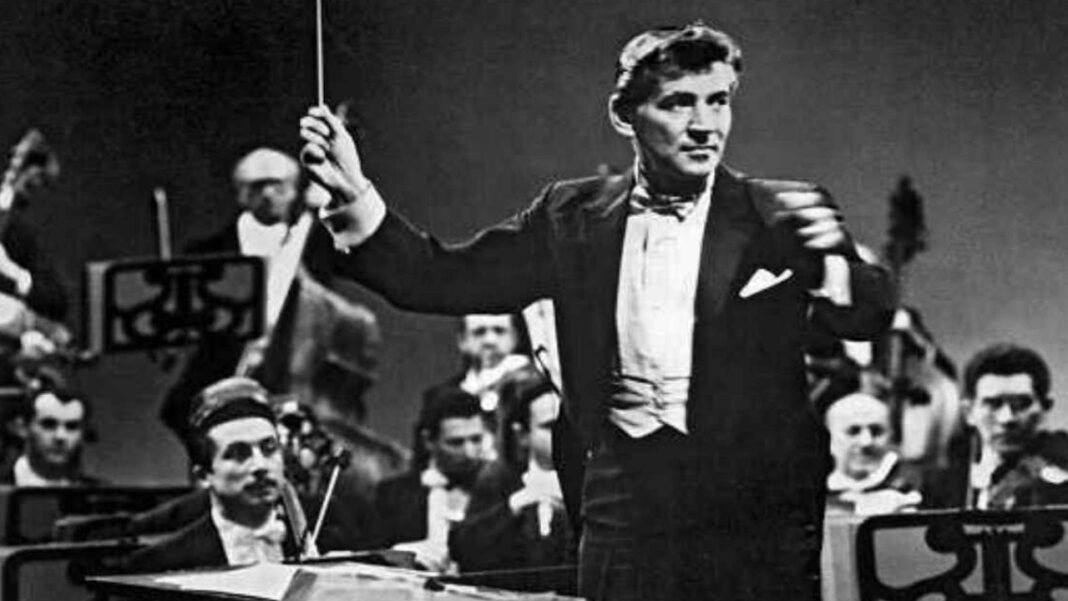Bradley Cooper’s Maestro hit Netflix on December 20 and is already garnering due attention from cinema lovers. In Maestro, a film co-written and directed by Bradley Cooper himself, Bradley takes on the role of legendary musician Leonard Bernstein.
But there’s a catch to the musician’s biopic on Netflix. Unlike most biopics that center around a person’s life and achievements, Bradley Cooper’s Maestro explores a different side of Bernstein’s life. His relationship with his wife Felicia Montealegre played by Carey Mulligan happens to be the central plot of Cooper’s Maestro.
Though Leonard Bernstein’s relationship with his wife as well as his affairs throughout his life is a worthy topic to explore there was much more to the multifaceted musician’s life and we took it upon ourselves to introduce you to the vital details of his larger-than-life persona.

Leonard Bernstein’s Early Life and his rather Elaborate Musical Education
Leonard Bernstein was born on August 25, 1918, into a Jewish family in Lawrence, Massachusetts. His father was the owner of The Samuel Bernstein Hair and Beauty Supply Company and hoped for his son Leonard to one day take up the family business. As a Jewish immigrant, Leonard Beenstein’s father was not very welcoming of the musical career that his son was leaning toward all thanks to his aunt leaving her old but upright piano at the Bernstein house.
Leonard Bernstein, also known as Lenny to his friends and family, began teaching himself piano. Soon enough young Lenny started insisting his father pay for his professional Piano which he vigorously refused.
Much to his father’s disliking, Leonard Bernstein ended up attending Harvard College in 1935. He studied music there, along with the likes of Edward Burlingame and Walter Piston.
In his sophomore year at Harvard, Bernstein met famous conductor Dimitri Mitropoulos. It was he who encouraged Bernstein to become a conductor. He graduated from Harvard in 1939 with a Bachelor of Arts degree but his academic pursuit of music did not end here.
He went on to attend the prestigious Curtis Institute of Music in Philadelphia where he studied conducting, piano, orchestration, and score reading.
Somebody’s loss is Somebody’s gain
After receiving a diploma in conducting from the Curtis Institute of Music, Leonard Bernstein went to live in New York where he earned a living by giving piano lessons and coaching singers. He also played Piano for dance classes at Carnegie Hall, the same place where he would later make his conducting debut.
On November 14, 1943, Leonard Bernstein was called in as a substitute after guest conductor Bruno Walter caught the flu and pulled out at the last minute. Bernstein did not let the once-in-a-lifetime opportunity go to waste. He made his New York Philharmonic conducting debut without prior rehearsal and left a mark. Bernstein’s name was now etched in golden ink in the history of music.
An ardent advocate of social and human rights
In today’s age where we see actors and artists keep their lips sealed over matters of importance, Leonard Bernstein used his influence to further several social and humanitarian causes throughout his life. His robust support for artists of color in music, instigating blind auditions at the New York Philharmonic in the 1960s, his support for the civil rights movement, and his protest against the Vietnam War are among a few of his notable humanitarian and social efforts.
Bernstein’s constant attachment to social, civil, and political activism had the FBI maintaining an 800-word file on him.
He loved his wife but continued to have relationships with his male colleagues
Leonard Bernstein married Chilean actress Felicia Montealegre in 1951 and stayed with her until she died in 1978 but he was also well known for his relationships with his male colleagues. The father of three, Bernstein reportedly had intimate relationships with his male colleagues including one with music producer David Oppenheim.
In a 2023 interview given by his daughter Jamie to People Magazine, she revealed that his father was bisexual. “He was bisexual and had this whole other life having relationships with men,” she noted.
Notable achievements and later years
Leonard Bernstein was the recipient of multiple awards including seven Emmy awards, two Tony Awards, 16 Grammy Awards, and an Academy Award nomination. His Young People Concert with the New York Philharmonic also stands among his greatest achievements often credited with introducing classical music to humble households. He died on October 14, 1990, after suffering from a heart attack instigated by progressive emphysema and a series of other pulmonary infections.







